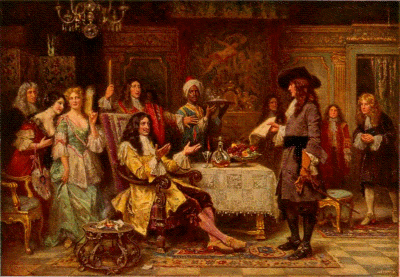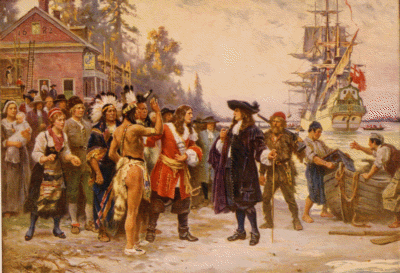 SKC Films Library |
| SKC Films Library >> American History >> United States: Local History and Description >> Middle Atlantic States >> Pennsylvania |
| William Penn founder of Pennsylvania William Penn was born in London on October 14, 1644, the son of Admiral William Penn and Margaret Jasper. He was educated at the Chigwell School in Essex, and entered Christ College, Oxford University, in 1660. At Oxford, Penn rebelled against the extravagant dress and behavior common amongst the students at that time, as well as the university rule that all students must attend the Church of England. He began meeting with other students who believed in religious freedom, and was expelled for his actions in 1661. His father then sent him to France and Italy in hopes that William would forget, or at least moderate, his religious beliefs. When William returned to England in August 1644, he seemed to have lost his religious zeal, and his father sent him to Lincoln's Inn, the most prestigious law school in London. Persecution In 1667, William was sent to manage his father's estates in Ireland. There, he became acquainted with Thomas Loe, a preacher in the Society of Friends (Quakers). Penn found the beliefs of the Friends to be very much in line with his own and joined the church in 1668. At the time of his conversion, the Quakers were being persecuted for having beliefs that differed radically from the Church of England, and because they refused to swear oaths of loyalty to anyone, including the king. Penn was imprisoned three times for preaching and writing about Quakerism. He was first imprisoned in the Tower of London, where he spent eight months before his father was able to secure his release. During this imprisonment, Penn wrote No Cross, No Crown (1668), in which he explained Quaker beliefs and practices. On August 14, 1670, Penn was arrested at a Quaker meeting and charged with rioting and conspiracy. During his trial, he demanded to see a list of the specific charges against him and the specific laws he was accused of breaking, rights guaranteed to him by English law, but the Lord Mayor of London refused his demands. When the jury ultimately found him not guilty, the Lord Mayor not only nullified the verdict and deemed Penn guilty, he also had the entire jury jailed for "contempt of court." Fighting their imprisonment, the jurors ultimately had all of the Lord Mayor's verdicts relevant to the case overturned, and also ensured that all future juries would be free from the control of judges. On April 4, 1672, Penn married Gulielma Maria Springett. The union ultimately resulted in seven children, four of whom died in infancy. Founding of Pennsylvania In 1675, Penn was asked to settle a dispute between two owners of land in the West New Jersey colony. It was ultimately agreed that Penn and two other trustees would govern the colony, for which Penn drew up a charter with rules of government. Two years later, a group of 200 Quakers arrived in West New Jersey and founded what is now Burlington, Pennsylvania. Penn stayed in England, but drafted a charter of liberties for the settlement that guaranteed free and fair trials by jury, freedom of religion, freedom from unjust imprisonment, and free elections. King Charles II owed Penn's father a large sum of money, and, in 1680, Penn asked the king to repay the debt with land in America (his father had died in 1670). On March 4, 1681, a charter was granted, giving Penn the territory west of the Delaware River between New York and Maryland. Penn was going to call the land Sylvania (Latin for "woods"), but the king changed it to Pennsylvania ("Penn's woods") in honor of Admiral Penn. The land was opened to settlement by Quakers soon after, and within a few months thousands had traveled from England, Germany, the Netherlands, and elsewhere to settle in Pennsylvania. As proprietor of the colony, Penn created a Frame of Government, adopted April 25, 1862, which established a democratic system of government. Under its terms, Pennsylvania was to be governed by a Council (of 72 members), responsible for proposing legislation, and a General Assembly (of up to 500 members), responsible for either approving or denying that legislation; as Governor, Penn had veto power over any legislation. Penn's government was not only the first in America to use a two-house legislative system, it was also the first to allow for peaceful change through amendments. King Charles II granting
Pennsylvania to William Penn William Penn saw his colony for the first time when he arrived at New Castle (now in Delaware) aboard the ship Welcome on November 8, 1682. That same year, he made his first treaty with the Indians, in which he agreed to always pay a fair price for lands settled by his colonists. Penn was the only colonial leader to deal with Native Americans fairly, and as a result Pennsylvania escaped the Indian wars that plagued other colonies. Not only did Penn always see to it that the Indians were fairly compensated for their lands, he also learned as many of their dialects as he could so he could negotiate with them without a translator. He also wrote a law making ill treatment of Native Americans a crime, and providing that any trial involving a settler and an Indian be judged by a jury composed of equal numbers of colonists and Indians. After seeing his colony off to a good start, Penn returned to England in 1684. William Penn arrives in
Pennsylvania Later Life In 1685, King James II, an old friend of the Penn family, ascended to the throne. Although he was a Catholic, his friendship with Penn led to his granting pardons to many Quakers and other religious dissenters. But the Revolution of 1688 brought William and Mary to the throne, and James II was exiled. Penn came under suspicion due to his friendship with James, and was arrested several times. Although he was finally cleared of all charges in 1693, he was not allowed to leave London. Two of his greatest works were written during this time -- Essay Towards the Present and Future Peace of Europe (1693) and Some Fruits of Solitude (1693). His Essay was a plan for a league of nations in Europe based on international justice. The other work was a short book of wise sayings. Guilelma Penn died on February 23, 1694. William married Hannah Margaret Callowhill two years later. In 1699, Penn returned to Pennsylvania, where there had been troubles with government, slavery, and piracy. He solved the problems and rewrote the constitution to meet the new needs of settlers, and returned to England in 1701 when the king tried to make Pennsylvania a royal province. The king died before he could carry out his plan, but Penn soon faced new troubles. Never good at business affairs, Penn had entrusted the finances of his colony to a man who, it turned out, had been racking up debts in Penn's name. Penn ended up spending a year in prison for debts. Although he finally cleared his name, the ordeal ruined his health, and in 1712 he suffered a stroke that left him unable to speak or care for himself. He died at his home in Ruscombe, Berkshire, on July 30, 1718. SEE ALSO |
| SKC Films Library >> American
History >> United States:
Local History and Description
>> Middle
Atlantic States >> Pennsylvania This page was last updated on October 13, 2017. |

